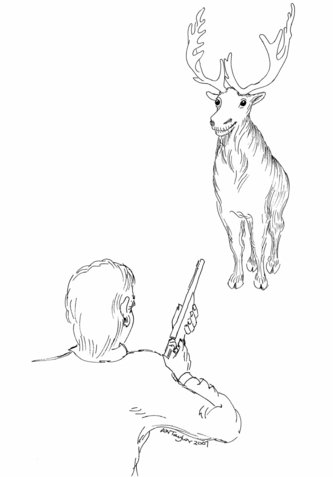The Golden Leg (4 page)
Authors: Dale Jarvis


T
wo British sailors were heading back to
their ship, which lay at anchor in the protected harbour. They were returning
from a dance, having spent the night flirting with local girls, and enjoying
their first shore leave in some time. The walked along, joking with each
other,
The streets of the old city were dark, with houses built right out onto the
narrow sidewalks, but the moon peeped out from between the buildings, doing her
best to light their way.
As they walked through the shadowy streets, they noticed a woman standing in
their path. She was dressed in a beautiful, long, flowing black dress with
beadwork across the front. She wore an elegant if slightly old-fashioned hat,
and her face was hidden behind a veil of black lace.
The young men tipped their hats to her as they approached. As they made to pass
by her, much to their surprise, she called out to them.
“Gentlemen,” she said, in a low, warm voice, “I have somehow found myself
locked out of my own home. Would you be able to help me?”
Without a moment’s hesitation, the two men offered their
assistance, saying they would do whatever they could. The woman in black nodded,
and beckoned them to follow her with one elegantly gloved hand. She set off
through the darkened streets, the men keeping pace alongside her, her heels
clicking on the cobblestones.
The street ran down the hill toward the water, and as was typical for that part
of the town, the houses were built side by side, adjoined in a row. Eventually
the woman stopped in front of one door.
“Number 16,” she said, pointing to the house.
It was a grand old house, large and stately. It had a great wooden door,
painted green, with a brass knocker that gleamed in the moonlight. At either
side of the door were two great bay windows than ran from the ground up to the
second storey. Heavy wooden shutters barred the windows on the main floor, so
nothing could be seen inside, though looking up, the men could see lights
shining in the rooms above.
One of the sailors reached into his pocket, and took out a folding knife which
he always carried with him. He undid the latch on one of the shutters, opening
it up. His friend hoisted him up, then sliding the blade of the knife up between
the sashes of the window, he was able to trip the latch, and slide the window
open. The sailor climbed in through the window, pushing aside the rich velvet
curtains, and found himself standing in a most remarkable room.
The sailor’s jaw dropped, as he looked about him. The
lady, or
her family, was obviously very well off indeed. The room was decorated with
antique furniture, and the walls were covered with fine paintings. It was lit
with candles which burned in ornate holders, and everywhere was the gleam of
gold, silver, and crystal. He quickly made his way to the front door, finding it
locked from the inside with a heavy iron key. He turned the key to the lock, and
opened the door to admit the lady of the house and his shipmate.
The woman thanked the two men most graciously, and asked if they would come in
for a drink. Again, they did not hesitate, more than happy for the opportunity
of a both a drink and the company of a young woman.
Once inside, the woman stopped in the hallway where there was a hat stand and
large mirror. Carefully, she removed the long pins from her hat, and lifted the
hat and veil from her head. Looking into the mirror, she patted back her hair,
and turned to face the two men.
She was, quite simply, the most beautiful woman either of the men had ever
seen, or even dreamed of seeing. Her skin was as pale as alabaster, her lips as
red as blood, and her hair as long and black as a winter’s night without stars.
She ushered the two men into the parlour, and bade them to be seated.
The raven-haired beauty told them to make themselves comfortable while she
prepared their refreshment, and left them alone for a moment. The two men looked
at each other, hardly daring to speak. They looked around the room, taking in
the richness of the furnishings and artwork. Around them,
the
flickering flames of the candles danced and were reflected back.
Before long, the woman returned with a silver platter on which was a decanter
of wine and two crystal goblets. She served the men, but did not take a drink
herself. The three of them talked for some time, the woman asking many questions
about their stay in the town.
When they had finished the wine, which was the best they had ever tasted, one
of the sailors asked if she minded if they smoked. She assured them she did not.
He took out a silver cigarette case, offering the lady a cigarette first. She
smiled, but declined the offer. He and his companion each took a cigarette, lit
them and smoked, conversing for a while longer. When they were finished, they
thanked her for the drink, and she in turn thanked them once more for coming to
her aid. She showed them to the door, and shook their hands, blessing each of
them with a heartbreakingly beautiful smile.
The two men wished her a good night, and as they stepped out onto the street,
they heard the click of the heavy iron key turning in the lock behind them. They
followed the street downward toward the harbour, and before too long they found
themselves by the gangplank leading to their ship.
Before they boarded, they decided they would have another quick smoke. The
sailor with the cigarettes reached down into his pocket, but found it
empty.
“Blast!” he exclaimed to his mate. “I’ve left my cigarette case behind.”
His friend readily agreed to go back with him, so the two men
walked back up the hill, retracing their steps, and made their way to the house
of the woman in black.
When they arrived at Number 16, they looked at the house in some confusion. It
was the same house, but looked dramatically different from the stately home they
had visited earlier that evening. The front door was weathered, with peeling
paint, and the brass door knocker was old and tarnished. The shutters were gone
completely from the windows on the main floor, and the windows themselves had
been boarded over. No lights could be seen through the broken panes of the glass
in the windows up above. The house looked completely abandoned.
Mystified, the men knocked on the door, but though the sounds of their banging
echoed through the street, no one answered their call. They went to the windows,
and peered through the cracks in the boards, but saw nothing. Noticing that a
few of the boards were loose, they pried them off. Once more, one of the sailors
used his knife to jimmy open the window latch. He pushed open the sash, and
climbed through.
This time, the sailor found himself in pitch darkness. He struck a match, and
looking around, saw that the room was completely empty. The antique furniture,
the fine paintings, everything was gone, and in their place were only shadows
and long cobwebs. He hastened to the front entrance, found the old iron key
still in the lock, turned it, and pushed open the door with a rusty
screech.
The two men found the stub of an old candle on the floor near
the doorway, and lighting it, they made their way back to the parlour where the
woman had served them wine. It was empty as well. With a quaking hand, one of
them pointed down. The floor was thick with dust, but the dust had clearly been
disturbed recently, as there were two distinct sets of footprints that led into
the room, and back. The men stepped into the room, and comparing the footprints
to their own, they saw that they were exactly identical.
Both men could feel the hair rising on the backs of their necks. They
immediately turned to leave the room, and as they did so, one of them kicked
something with his foot, and it skittered across the floor with a metallic
clang. He reached down, and picked up the object. It was his own cigarette
case.
The men had no desire to remain a minute longer in the house. Quickly, they
fled the property, hurrying back to the safety of their bunks on board ship.
Later, they asked some of the local people if anyone lived in the old house at
Number 16, and were told that it had been abandoned for as long as anyone could
remember. Eventually, they were directed to a very old man who had lived on the
street as a boy.
The old man said that he too had never known anyone to live in the house at
Number 16, and that he was sorry he could not help them in their quest for
answers. He told them that as children, they had been directed to stay away from
the house, as it was believed to be haunted by the ghost of a young woman, who
had died in the property many years before he was born.
“I ofttimes looked at that house, hoping to see the ghost,”
said the old man with a slightly wistful expression, “but I never did. No one
remembers her name, but she was said to be heartbreakingly beautiful, with skin
as pale as alabaster, lips as red as blood, and hair as long and black as a
winter’s night without stars.”

I
f there was ever a man who could shoot,
hunt, or trap, that man was Thomas Conway. Tom, as he was known to his family
and friends, was a sturdy man, and an excellent hunter. He was the eldest of the
Conway sons, and the Conway family never wanted for fresh meat when Tom was
around.
Tom was a legendary shot, and it was rare for him to miss his target. Every
winter his sharp eye and steady hand would help supplement the family income
with a steady supply of fox pelts, which always fetched a good price.
St. Bride’s was the community that Tom called home, and his father lived about
fourteen miles down the road in a spot called Point Lance. One fine winter day
in 1804, Tom hitched his horse to the sleigh, packed up some provisions for his
father, and set off.
About seven miles out, a magnificent black stag stepped out onto the road and
stopped there, proud and tall. Tom had kept his rifle handy in case he spotted
any game. He stopped the horse, reached for his loaded gun, raised it to his
shoulder, and fired.
Much to Tom’s dismay, the shot seemed to have no effect on the
great black stag. He kept one eye on the beast and reloaded his gun. The stag
barely moved as Tom stepped down out of the sleigh. Tom raised the rifle and
fired. Again it seemed to have no effect, and the stag just stood there, not in
the slightest bit concerned.

Cursing at himself for missing twice, Tom muttered that he would
fix that stag with the next shot. He poured out his gunpowder, doubling the
power of his shot. He took slow, careful aim and fired once more.
When he looked, the stag was still standing, unhurt and unmoved. Indeed, the
stag stood staring back at Tom, with a very peculiar look in its eyes.
Tom grew alarmed at this strange behaviour, and even the horse seem unnaturally
restless. Deciding there was something uncanny about the black beast, he got
back into the sleigh, and urged the horse onward. The horse needed no
encouragement, and they covered the remaining seven miles to Tom’s father’s
house faster than they ever had before.
Laughter greeted Tom when he shared his story about the black stag.
“Your aim must be getting bad,” joked his father.
After a short visit, Tom said that he must be heading back toward his home. His
wife was soon to give birth to their child, and he did not want to leave her
alone too long. The horse started to trot along the road as a light snow started
to fall, and Tom waved goodbye to his father. It was the last time that his
father was to see him alive.
Hours passed.
Tom’s wife and brother were anxiously awaiting his return home. It was dark by
this time, and Tom had been gone much longer than had been expected. Imagine
their surprise when the horse galloped up to the door of Tom’s house. The horse
was covered with sweat and trembling in terror. The
harness was
broken, and there was no sign of Tom, nor of the sleigh.
Worried, Tom’s brother raised the alarm. Nearly the whole community came out,
and when day broke the next morning, they set off to search for the missing
man.
About seven miles along the road, at the same spot where Tom had met the black
stag the day before, they found Tom. He was stretched out dead on the sleigh,
cold as the grave. The contents of his powder horn had been poured over his
face, but there were no marks of violence on his corpse. There were no tracks of
animals or footprints of men anywhere in the snow, likewise there was no
explanation as to how the horse had snapped its harness and freed itself from
the sleigh.
When news of Tom’s death was brought to his father, the man shared the story of
the black stag that Tom had encountered before his death. Tom’s demise was
immediately blamed on some evil spirit, who had appeared on the roadway in the
form of the great black stag.
As tragic and terrifying as the story is, it did not end there.
Tom’s widow gave birth to their child, and a few weeks later decided that the
child must be christened. As there was no priest locally, she had to travel to
the town of Placentia to have the babe christened. Off she set, accompanied by
Tom’s brother and a man who worked for the family. They arrived safely in
Placentia, the child was duly christened, and they resided for a few days with
friends. Then the foursome started for home.
Like Thomas Conway, they never arrived home. When a search party
went out, they found that all four of them had met a sudden and shocking death
on the road, in the same vicinity as Tom’s strange demise. Tracks in the snow
indicated that they had met something, and that they had run one way and then
another to avoid whatever it was.
Like Tom, there was no mark of violence on their bodies. The weather was mild
and all four were warmly dressed, so they had not died of exposure. They were
well-stocked with food, and the friends in Placentia later stated that they had
all been hale and hearty when they left. Whatever they had encountered, it
seemed, had scared them to death.
The mystery has never been solved, and the strange circumstances surrounding
the deaths of those five people along that stretch of road have never been fully
explained. But if you ask the older residents of the area, they will place the
blame firmly on a malevolent spirit, who for its own fiendish purposes, assumed
the terrifying form of a black stag.
